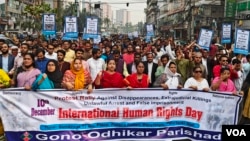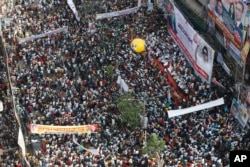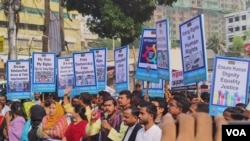Six members of Bangladesh's largest opposition party have died in prison in two weeks, their relatives and leaders of the party said.
The six men were among tens of thousands of leaders and activists of the Bangladesh Nationalist Party, or BNP, who were arrested in a crackdown on the opposition ahead of the next general elections, to be held on January 7.
BNP Senior Joint Secretary General Ruhul Kabir Rizvi told VOA that party leaders and activists are facing an "inhuman level of torture" after being picked up by police.
"They are being tortured in the custody of police and while in jail, after being arrested in false politically motivated cases. After torture leaves them wounded, in most cases they are denied medical care and some of them are dying in custody," Rizvi said.
Home Minister Asaduzzaman Khan Kamal rejected the allegation of torture of the opposition activists in custody.
"None is tortured in police custody or jail. Everyone in jail receives proper medical treatment following jail rules. The BNP claims of torture [are intended] to get sympathy and political advantage," Kamal told local reporters.
The BNP has been demonstrating across the country for months, demanding the resignation of Prime Minister Sheikh Hasina and the installation of an election-time neutral caretaker government which, the opposition party said, would ensure a free and fair election.
Following a massive opposition rally in Dhaka on October 28, the government launched a crackdown targeting the BNP leaders and activists, accusing them of resorting to violence.
'Denied access to medical treatment'
According to the BNP, over 21,000 of its activists — including its entire leadership — have been arrested since the October 28 rally.
Some activists are badly wounded during torture in police custody before being sent to jail custody, Dr. Mohammed Rafiqul Islam, health affairs secretary of the BNP, told VOA.
"The activists report their illnesses to the prison authorities and beg for the arrangement of medical treatment. The prison authorities often do not allow the opposition political activists access to proper medical care, many of the arrested activists and their relatives told us," said Islam, a urologist.
"Some with fatal injuries or sickness are dying in the prison in the absence of medical treatment," he said. "In two weeks, six BNP leaders and activists died in prison, and in each of the cases a history of negligence of medical treatment in jail custody has been reported."
Many relatives of the BNP activists who died in prison echoed the views of Islam.
The mother of one BNP activist told VOA that her son's medical condition worsened and he died after he lost access to his daily dose of medicine for hypertension after his arrest.
"When we went to jail to see my son 10 or 12 days after his arrest, he appeared very sick and was unable to stand," she said. "He told us to arrange to get him out of jail and take him to a hospital outside as soon as possible."
The mother, who fears retaliation from police and does not want to be identified, quoted her son telling her that he had told jail officials many times about his worsening physical condition, "but they are not sending me to any hospital."
"By the time they sent him to a hospital several weeks after his arrest, it was too late," the mother said. "He died a few days after."
Several relatives of the activist told VOA that they saw bruises on his chest and other parts of his body when it was handed over to them for burial.
Prisons overcrowded
According to official figures provided in the first week of November, Bangladesh's 68 prisons held 88,000 inmates, more than twice their intended capacity of less than 43,000.
One rights activist who interacted with many prisoners in Bangladesh recently said many of the detainees had reported being tortured in the custody of the police Detective Branch.
"They said they had been given electric shocks, subjected to waterboarding and beaten around their joints, before being sent to jail custody," said the activist, who asked not to be identified for fear of retaliation.
"Although many of them were sick because of torture, none received medical treatment in jail," the activist told VOA.
Ali Riaz, professor of political science at Illinois State University, said the deaths of the political activists in jail "show a pattern which can be described as extrajudicial killings."
If there is evidence showing that the activists were tortured in custody, "it's a violation of fundamental rights of a citizen, and the law of the land," he said.
In recent weeks, local newspapers published reports of opposition activists being attacked by unidentified masked men. In some reported cases, the activists were abducted or killed.
Riaz added: "The deaths in custody in combination with recent attacks and abductions of BNP activists by masked men indicate that extrajudicial killings and enforced disappearances are now back in Bangladesh with more lethality."
Human Rights Watch, in a November 26 report, called the government's action against the political opposition a "violent autocratic crackdown."
Julia Bleckner, senior Asia researcher at HRW, said that her organization had documented allegations of torture of opposition party activists picked up in the recent crackdown. She said there should be transparent independent investigations into each case in this "disturbing spate of deaths in custody."
"Prison authorities cannot just dismiss these deaths by saying the individuals died of natural causes," Bleckner told VOA.
"The government authorities are undermining claims of a fair election by ignoring rule of law. Authorities should release those arbitrarily arrested, investigate all claims of torture, and hold those responsible to account."






